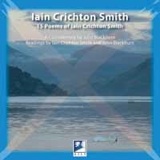
A Commentary
Readings by Iain Crichton Smith and John Blackburn, with commentary by John Blackburn
Published in: Audio CD (2 disks).
By: Association for Scottish Literary Studies, Glasgow, October 2008.
Price: £14.95
ISBN 978-0-948877-89-6
Iain Crichton Smith was a prolific and accomplished writer in English and Gaelic, as well as a capable dramatist, again in both languages, but it is as a poet above all that his reputation will endure. His principal collections are in English: Thistles and Roses (1961), Deer on the High Hills (1962), The Law and the Grace (1965), Hamlet in Autumn (1972), The Village and Other Poems (1989) and The Leaf and the Marble (1989); and in Gaelic Bìobuill is Sanasan-Reice (Bibles and Adverts) (1965), Eadar Fealla-Dha is Glaschu (Between Fun and Glasgow) (1974) and Na h-Eilthirich (The Exiles) (1983). In them his subject matter deals with the Highlands, Scotland and the wider world and demonstrates familiarity with the literature of Europe and America and the literary movements of his time.
This double CD contains recordings of Iain Crichton Smith reading his poems. Introductions and commentary by John Blackburn cover the major themes of his career: the struggle between light and dark and his ambivalent attitude towards religion, sometimes oppressive, sometimes full of grace. It is an excellent resource for home or classroom study, as well as providing an opportunity to hear one of the great poets of the twentieth century reading his own work.
CONTENTS
CD1:
- ‘Some days were running legs’
- Biography and background of Iain Crichton Smith
- The style and range of his poetry
- ‘Poem of Lewis’
- Lewis and the religious background
- ‘Old Woman’
CD2:
- Theme of conflict between the dark and the light
- ‘Calvinist’ themes
- ‘Eight songs for a New Ceilidh No. 1’
- ‘I Build an Orange Church’
- ‘Going Home’
- ‘Owl and Mouse’
- ‘Brueghel’
- ‘Hallowe’en’
- Theme of grace
- ‘Two Girls Singing’
- ‘A Young Highland Girl Studying Poetry’
- ‘Old Woman With Flowers’
- ‘When Day is Done’
- ‘The “Ordinary” People’
- ‘None is the Same as Another’